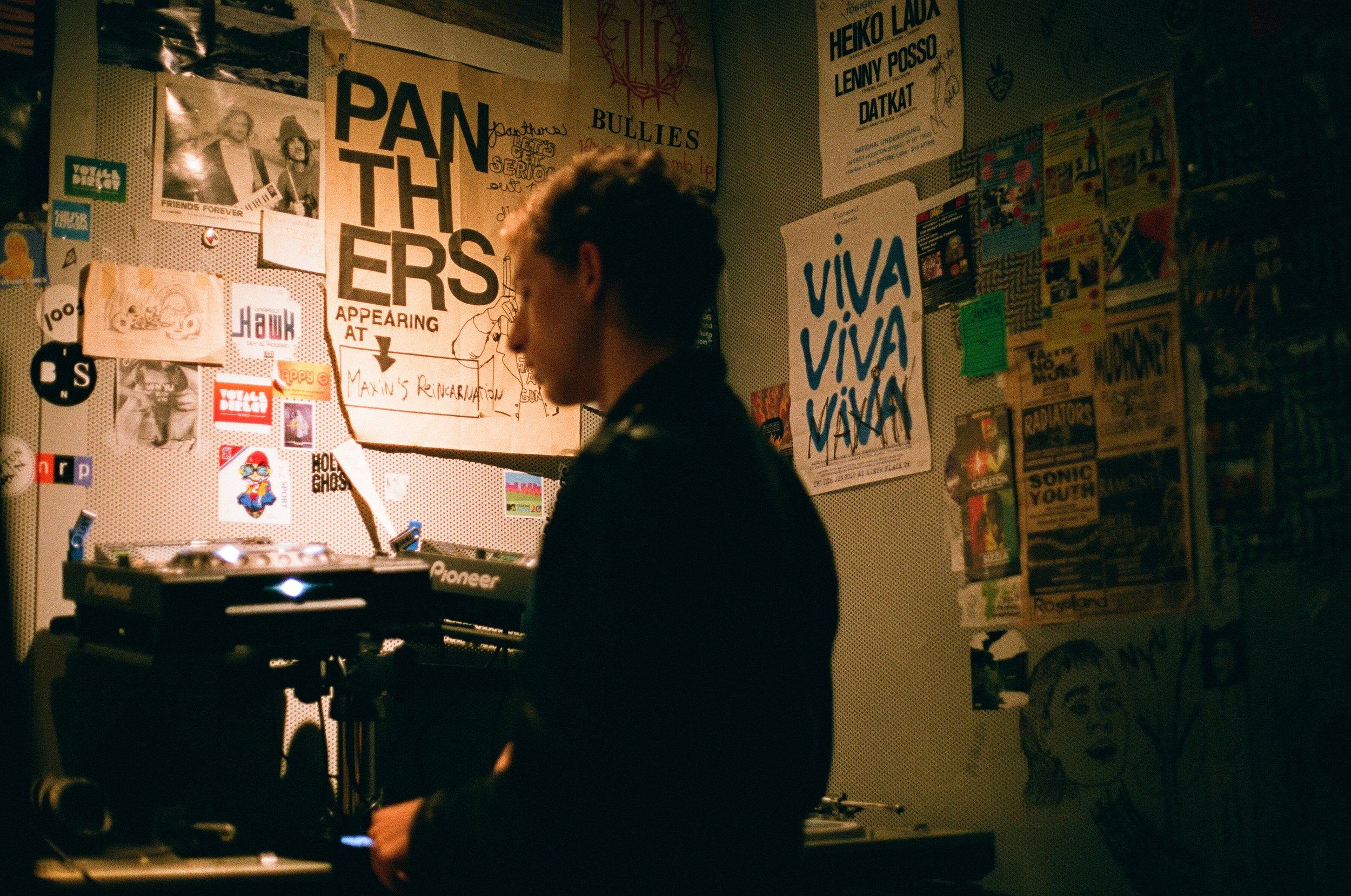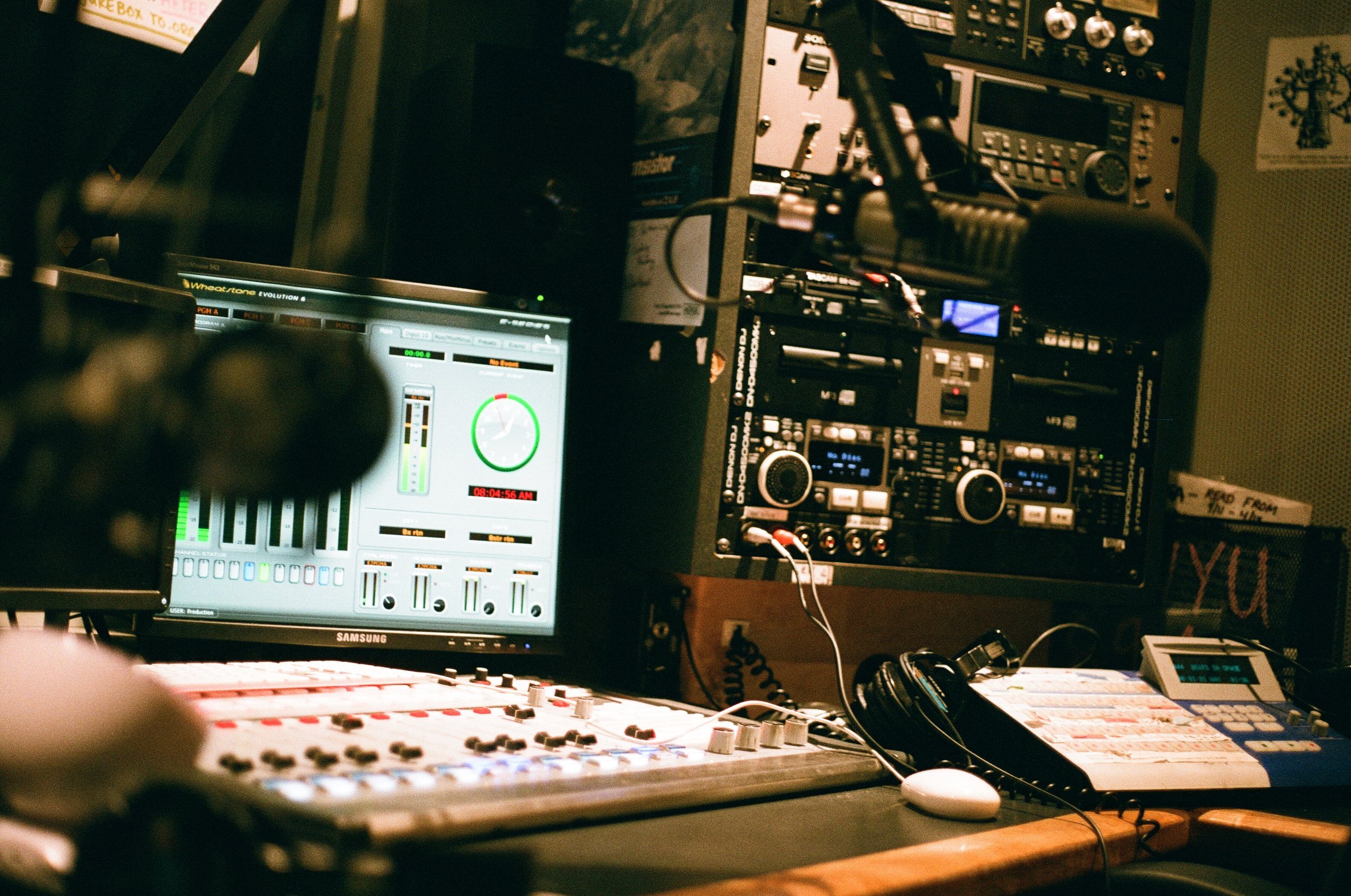Austin Christy
The basement studio for WNYU, NYU’s public radio station, is exactly what you picture when you think of student radio. The door is papered with so many flyers that I overlooked it the first three times I went looking, despite being literally 6 inches from it, and inside the stickers, tags, and posters take over every spare flat surface from shelving to cabinets to the flat sides of staplers. I got there just in time to sit down with Austin Christy for his radio show, Peter Cat Radio which pulls together “the best of jazz, jazz fusion, funk, and experimental music released by Japanese artists between the 1960's and 80's.” After the show, we went to Newsbar coffee up the street to talk over breakfast and coffee.
Christy calls himself an artist and a student, but is hesitant to define himself any further, “The reason that I say artist, rather than just musician, right off the bat is I feel like musician sort of boxes in and limits the idea of what a person can do with that medium, or just with other things. So I don’t really like considering myself a musician because that’s not the only thing that I do. I feel like the radio show in a way is a sort of artistic activity...I just happen to play music as well.”
‘I just happen to…as well’ is a common trend for Christy, whom (full-disclosure) I’ve known nearly as long as I’ve lived in New York. The first time I visited his apartment, I asked who had made the paintings hanging around the space he shares with his brother. Slightly bashfully, he acknowledged that he had painted them—he’d never even mentioned painting to me before. When I brought up his painting during our interview, he laughed and shrugged it off, “I’m not a painter.”
But his radio show is clearly where a lot of his artistic energy is directed at the moment, “I’ve been doing the show since last February I think. And I really just got involved because I wanted to get more involved with things happening at NYU. I feel like I wasn’t involved in any clubs or any sense of community outside of just my classes and I felt the radio show would be cool. So I had some friends who were doing it already and I just applied with this theme of Japanese music from the 60s and 70s and show them what a possible playlist could be like and explain to them why it’s interesting that this music exists in the first place. And I guess they liked the idea and gave it a show. And I ended up doing more with it than I thought I was going to do. I didn’t expect it to become as important as it is to me right now.”
I ask him how curation had influenced his own experience as a musician. “I almost shy away from the idea of curation at this point because I feel like it assumes what I’m doing is having an elite taste where you can filter out what’s bad and what’s good. And show people like oh, this is what’s good and this is what’s interesting out of everything else. But most of the time when I’m picking songs or something, I think it changed my way of listening to music a lot in the sense that I listen to music more in a macro sense. I try to consume as much music as possible in time to get the show ready to go. A lot of the time I don’t listen to the song all the way through, I skip through different parts and you just look for the sweet spots of different things and you’re like oh this one has a lot of sweet spots, this one’s gonna work. This one’s gonna sound really good. Or this one’s like kinda weird but, it’ll fit, or people need something weird throughout the show. I’m not really trying to like have a specific plan going into it or to filter anything bad out, I think it’s even good to have bad songs in the playlist every once in a while because so often we listen to music and we’re kind of in a post-radio age where everyone’s got their curated Spotify playlist, everyone listens to music that they select for themselves, so it’s hyper-individualized, and the radio show has just taught me to sort of open up my mind a little bit more to music that I wouldn't normally listen to.”
Christy doesn’t object as much to the idea that he collects and presents music, but laughing again says that he feels like the majority of his job is basically to “scour the internet for Youtube videos.”
Youtube is a particularly powerful force within the Japanese jazz music community, Austin explained to me the incredible story of Midori Takada, who put out Through the Looking Glass, a minimalist, electronic album in 1983. It never went to CD and remained largely unremarked for two decades. But Youtube’s algorithm began lining up one of her songs from Through the Looking Glass after Brian Eno’s videos and eventually racked up more than two million views, achieving cult status among fans. “It’s people that wouldn’t have normally been able to be successful in the traditional music industry,” Christy says, ”Through these new mediums, they’ve been able to break through.”
When I ask him what taking a break means to him, he casts around for a few minutes, trying to come up with a worthwhile pun, but eventually turns more serious.
“I think it almost means like not taking a break. Fully throwing yourself into life, and just trying to be as present and as non-judgemental of other people as possible.”
“I feel like that’s what brings me the most calm—stepping outside instead of being like, ‘let me just sit in my room alone.’ I’ve done a lot of that. I can promise you it’s not fun.
“The new model [of taking a break] is going outside and doing shit, possibly breaking your arm and shit, but opening yourself up to that danger.”
Christy has been opening himself up more and more lately, he says he’s recently taken pressure to make a career out of music off of himself. “ I feel almost more comfortable just saying I just kinda play guitar and live through it or something. I sort of like the idea of playing guitar and keeping it as something personal and uninhibited by an industry over the idea of like making it work. And I don’t think it’s lack of ambition here, I don’t think it’s like giving up or something, I think it’s just like a shift in like how you think of it. There’s power and there’s freedom, in that, I think.”
Since our interview, Christy has interviewed Ryo Kawasaki and Akiko Yano for Peter Cat Radio, which can be found on SoundCloud. This past Halloween, Christy’s psychedelic rock band, Peter Cat Society, released its first single, “Holding”, available wherever you stream music.




